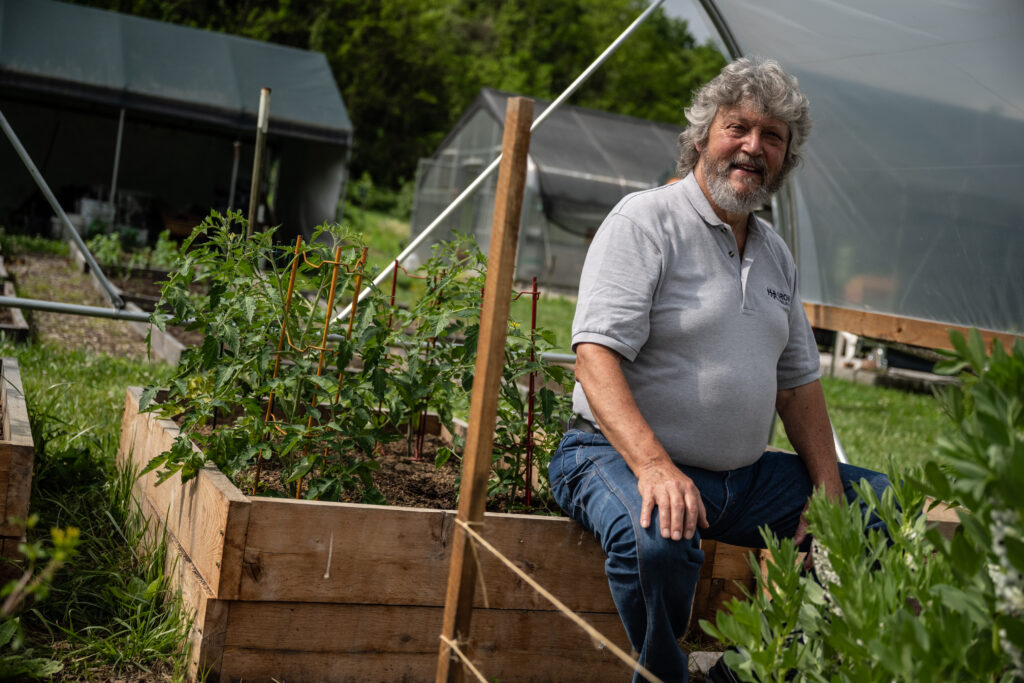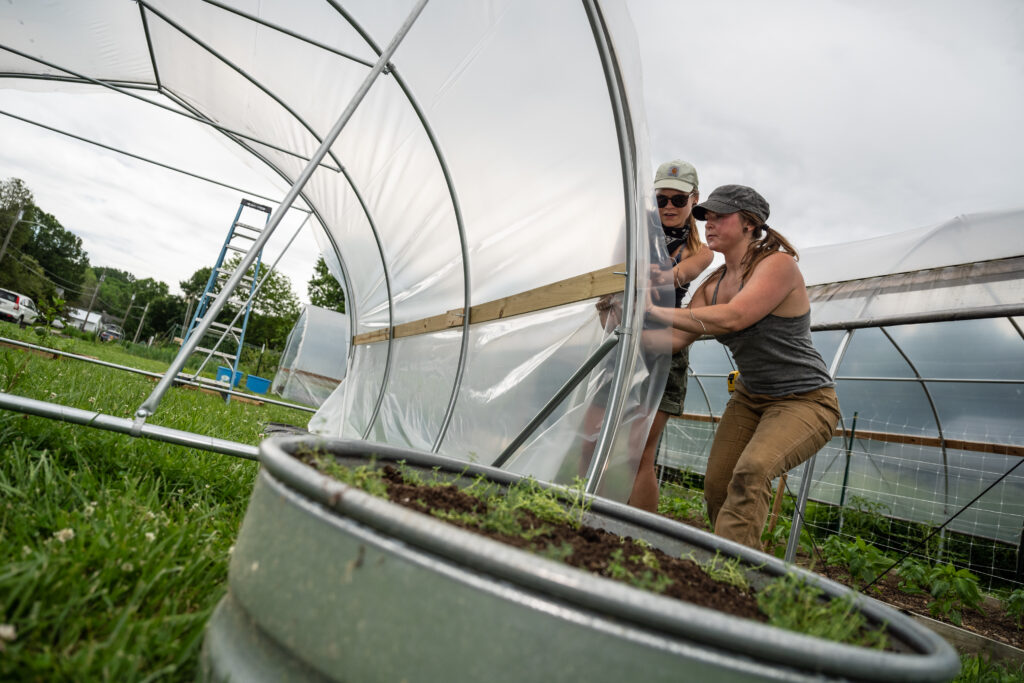Too often, in places like Appalachia, “help” looks more like “taking over.” The result is a temporary solution that isn’t sustainable when the help leaves. David Cooke, director of Grow Appalachia at Berea College, promotes a different approach.
“The bottom line is this: if you listen to people who live in Appalachia, and you work in true partnership with them to develop systems, and you help put the tools and resources in their hands and get out of the way, they can take care of their own problems,” Cooke said.
This commitment became the driving force behind Grow Appalachia. Following that philosophy, its partnerships and programs have provided tools and resources to combat food insecurity to community members throughout a six-state territory in central Appalachia that includes Kentucky, Tennessee, Ohio, West Virginia, Virginia and North Carolina. The initiative celebrates its 10th anniversary in 2020.

Having grown up in the coalfields of southern West Virginia, Cooke knew all too well the direct correlation between food insecurity and lack of wellness in the Appalachian region. This pressing issue is even more pervasive in coalfield counties, which rank among the worst in the country where prevalent health concerns like cardiovascular disease, obesity and hypertension are largely diet related.
“In a region that used to be almost completely self-sufficient, food-wise, we had become a region in which 95 percent of our food was imported from at least 1,000 miles away,” Cooke said.
So, 11 years ago, when Dr. Chad Berry, then-director of the Loyal Jones Appalachian Center, let him know that an investor had made an offer to Berea College to address the issue of food insecurity in the Appalachian region, Cooke was eager to jump on board.
John Paul DeJoria, co-founder and owner of John Paul Mitchell Systems and Patrón Tequila, wanted to empower people to help themselves. Cooke agreed to create a proposal, although he was already working two other jobs at the College—serving as director for the Berea College Appalachian Fund and program coordinator for the Entrepreneurship for the Public Good (EPG) program.
Even as a volunteer, Cooke was running the majority of this new program alone before it took off. He took on responsibilities such as teaching, data collection, recruiting and report writing. And he didn’t mind that he wasn’t being paid.
“I love to teach, and I love to see people get healthy as a result of that self-agency,” Cooke added. “At first, it really didn’t matter if I was paid or not. I loved doing it.”
Grow Appalachia took off within its first summer, and the program moved into four counties in eastern Kentucky. According to Cooke, his team worked with more than 100 families that summer who, in turn, produced roughly 120,000 pounds of food. Many of the families were first-time gardeners and eager to learn to provide for themselves.
“One of the reasons this worked so well in the beginning is because I actually went out in the field to talk to people,” Cooke said. “I asked the folks from those counties for their input, and the program we developed was the result of what a lot of people told me.”
Community collaboration
As DeJoria saw Grow Appalachia meeting the needs of the community, he continued to supply funding. Soon enough, the program was working with thousands of families on 10 different sites, and Cooke became its full-time director.
“It’s been a really tremendous partnership,” Cooke said. “We couldn’t do this without him.”
A decade later, Grow Appalachia’s mission goes beyond gardening and the vision to grow food. The program also provides resources for cultivation through classes covering a variety of topics such as food preparation, preservation and marketing for the excess produce.
The program continues to grow throughout central Appalachia, including partnering sites like Cowan Community Center in Whitesburg, Ky. Center director Valerie Horn teams with Grow Appalachia to provide those same resources to her own community, including hosting events like canning classes for preserving jams and jellies.
“I feel as comfortable sharing our challenges as I do our successes,” she said. “I feel I can count on their support and sharing of resources they have available.”
Cowan Community Center’s mission statement is aligned with that of Grow Appalachia’s, as it seeks to “provide educational, social, cultural and recreational experiences for the entire community in order to sustain a wholesome and healthy lifestyle that encourages intergenerational relationships.”

Horn shared that Cooke has invested a great deal of time and thought into the community through strong and quiet leadership.
“He isn’t seeking the spotlight, but he’s shining light on others,” Horn said.
Through each level of growth at Cowan Community Center, Grow Appalachia has been there to see it. Horn has found the support life changing.
“I look at my community differently and have made connections that will last my lifetime,” she said. “I have always had a strong connection to community, but seeing the impact this program has on the community has altered my life work.”
Food security in the face of the COVID-19 crisis
Just as Grow Appalachia approached its 10th anniversary, the world was forced to adjust to a deadly pandemic. Suddenly, an already food-insecure region lost a huge source of meals and nutrition: the public-school system.
After schools shut down across the nation, many students lost their only meal or two of the day. Cooke and Grow Appalachia scrambled to remedy this problem for local families with an already existing program, Berea Kids Eat.
In 2015, Berea College President Lyle Roelofs sent Cooke to a U.S. Department of Agriculture (USDA) workshop exploring the idea of universities serving as a food resource for children in those communities. Cooke was inspired to create something that would provide the children of Berea with food security in the summer and immediately started to build the framework for the program. After hiring Martina Leforce ’07 to lead the program, Berea Kids Eat was official.
The program partners with Berea College, the Kentucky Department of Education and the USDA to distribute breakfast and lunch to participants younger than 18. Recipients are not charged, and Grow Appalachia incorporates locally sourced produce into the meals as much as possible.
“A lot of kids, if they don’t eat at school, they don’t eat much,” Cooke explained. “Berea Kids Eat is a huge market that provides food security and support for local farmers simultaneously.”
In light of the challenges posed by COVID-19, Cooke and associate director Candace Mullins decided to leverage Grow Appalachia’s resources to free up more money for their surrounding communities.
This is the emergency we planned for, and we’re responsive to that. We’re going to do whatever it takes.
David Cooke ’82
Both Sodexo Dining Services at Berea College and the cafeteria in Berea Community School are producing the maximum capacity of meals for each facility to distribute through Berea Kids Eat. While it was only a temporary solution, Cooke said it will continue as long as there is a need.
In addition to providing meals for Appalachia’s youth, Grow Appalachia distributed extra funding to their partners who needed additional support for their communities in response to COVID-19. According to Cooke, the interest in family gardening has skyrocketed since the virus became of public concern.
“We offered the money to all 20 of our sites,” he said. “This is the emergency we planned for, and we’re responsive to that. We’re going to do whatever it takes.”
The program received abundant gratitude in turn for the generosity shown amid the pandemic. Nell Fields, president of the Cowan Community Action group, was among those to express praise in a time of hardship. She reminded Grow Appalachia what the knowledge of self-sufficiency means to people when they are faced with the need to survive.
“It has to make our communities feel so much more secure in their abilities and their family’s future knowing they have some skills in growing, cooking and canning,” Fields said.
Fields shared that both Cowan and Letcher counties in Kentucky have been much more prepared for this crisis through Grow Appalachia’s supportive efforts, as have the communities surrounding Berea.
Maybe Grow Appalachia’s 10th anniversary was a little unconventional, but the program continues to be a prime example of community and support, despite challenges it may face.
“This works because from Day One, we have worked in genuine partnership with the folks in these communities,” Cooke said. “This was never our idea. This was a collective idea.”


…